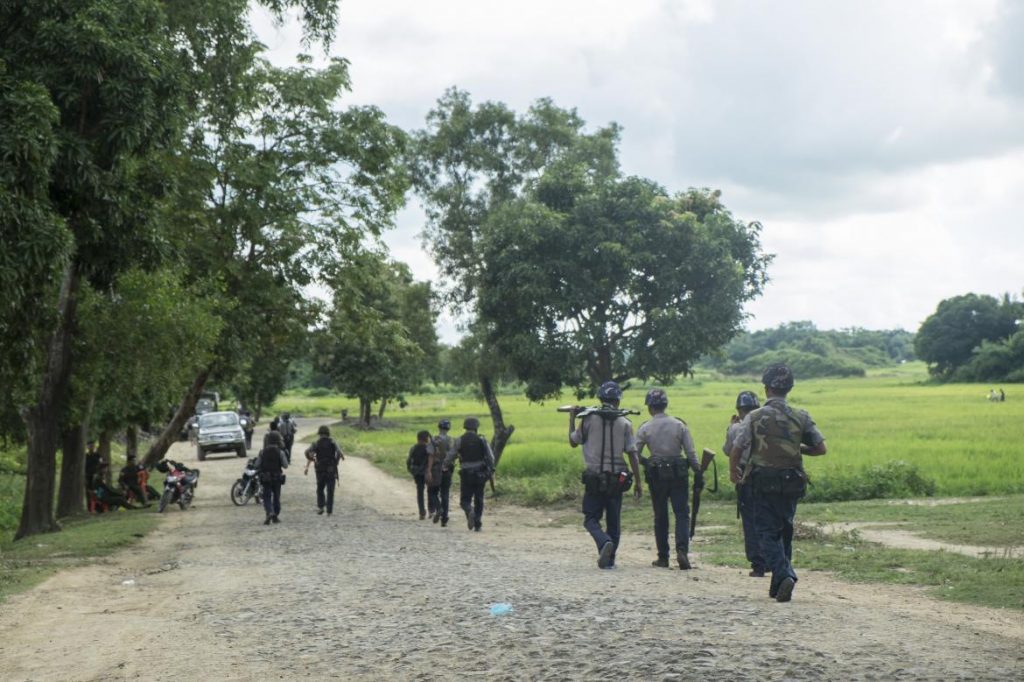By MRATT KYAW THU | FRONTIER
YANGON — At least 100 ethnic Rakhine residents have fled their homes after recent rumours suggesting imminent attacks by insurgent groups spread in Maungdaw Township in the north of the state over the weekend.
Local sources say that most Rakhine locals in Maungdaw’s northern villages have moved to the downtown area, along with some other households further south.
“They are not [permanently] leaving their houses,” Maungdaw police Maj. Kyaw Mya Win told Frontier. “It’s more like they are absconding for a while for their safety.”
The rumours began to spread after government security forces reported the discovery of an insurgent training camp in northern Maungdaw on June 24, along with the killing of two Rakhine men on the same day following a confrontation with locals at a Rohingya village.
Support more independent journalism like this. Sign up to be a Frontier member.
A Twitter account purporting to belong to the Arakan Rohingya Salvation Army, the group which claimed credit for the October 2016 attacks on security posts in Maungdaw, last week issued a statement denying ARSA’s involvement in the June 24 killings.
The account issued a statement claiming that the villagers had acted in self-defence after a group of Rakhine men had threatened to burn their homes down, and said it condemned any killing of civilians in Rakhine State.
“People are always alarmed here,” Maungdaw resident Ko Hla Moe said in response to the latest unrest. “People really need an official announcement from the government on the current security situation.”
In April, the government reported it had intelligence that insurgent groups were planning further attacks in northern Rakhine State to begin in June.
The failure of that prediction has not deterred the exodus from Maungdaw’s outlying villages, with reports from the area suggesting hundreds of Rakhine residents could have left their homes.
One police officer, who requested anonymity, said that wealthier Rakhine families had sent relatives as far afield as Sittwe and Yangon in anticipation of another attack.
Rakhine State Chief Minister U Nyi Pu made an official visit to several Maungdaw villages on June 27, meeting with residents from both the Rakhine and Muslim communities.
“At Kyein Chaung village, Muslim teachers requested to meet him and discuss their needs,” said an official involved in organising the trip. “They are also afraid of the rumours.”
The official added that the Muslims avoided talking to media accompanying Nyi Pu on the trip for fear of being targeted for retribution.
A statement published in the state-run Global New Light of Myanmar on Sunday said recent attacks and threats appeared “to be a coordinated attempt to destabilise the situation in northern Rakhine and incite further violence and unrest”, adding that police were working to identify the perpetrators.
After humanitarian aid was cut off to large parts of northern Rakhine during the military’s security clearance operation, the statement also claimed that humanitarian aid was now reaching 95 percent of the affected people in Rakhine State.
The government has claimed more than three dozen civilians, mostly Muslim, have been murdered since October 2016. The government says those targeted had largely worked as village administrators or passed along information about insurgent activities to officials.
ARSA has steadfastly denied any involvement in the murders and has attributed claims of its responsibility to a government propaganda campaign.
Hundreds more are believed to have been killed in the security crackdown that followed the October 2016 police post attacks, with nearly 75,000 people fleeing across the border to Bangladesh to escape the violence in the time since.







